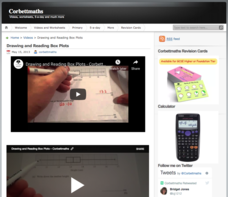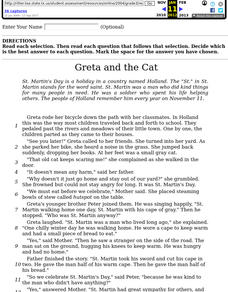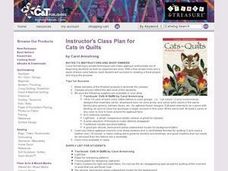Cat Teacher Resources
Find Cat lesson plans and worksheets
Showing 3,387 resources
Amoeba Sisters
Speciation
Why can't mules have babies? Answer this—and other burning animal kingdom mysteries—with a short, sweet speciation video! Zoology scholars examine the ins and out of evolution, the role geography plays in inheritable traits, and, most of...
Storynory
The Elephant’s Child
Curiosity may have killed the cat, but it gave the elephant a very useful nose! Listen to a retelling of Rudyard Kipling's "The Elephant's Child" that explains how the elephant's long nose came to be—and what a hungry crocodile had to do...
Storynory
How the Tiger Got His Stripes
Learn how the tiger got its stripes with a seven-minute audiobook featuring the classic folktale detailing the origin of the big cat's colorful coat.
Concord Consortium
Cheetah's Lunch
Run like a cheetah. A performance task challenges pupils to solve several different problems involving the speed of a cheetah. Given information for scenarios where the cheetah chases its prey, they determine if the big cat is fast enough.
Facebook
Social Media and Sharing
Whether it's cute cat videos or pictures from an epic vacation, scholars love to check out what's happening on social media! But, how much sharing is too much? A lesson from a vast digital citizenship series poses some serious points to...
Corbett Maths
Drawing and Reading Box Plots
Box and whiskers have more to do with data than they do with cats! A video lesson describes how to plot, analyze, and compare box plots. Mathematicians first learn to create a box plot and then how to use information about the quartiles...
Anywhere Math
Box-and-Whisker Plots
Whiskers are more than just a cat facial feature! Learn how the whiskers of a box-and-whisker help make conclusions about a data set. An instructor first explains how to create a box-and-whisker and then how to read it. Several examples...
MinutePhysics
Lorentz Transformations — Special Relativity Chapter 3
Generally, Lorentz transformations require high level math skills, but conceptual understanding can slip just beyond the grasp of many. Using a story and graph about the time and motion of people and cats, viewers of a short video can...
K12 Reader
Spelling Rules: Add S to Nouns to Make Them Plural
Would you like more than one cat? Or more than one prize? Learn how to make singular nouns plural by adding an -s to the end of each word.
Reed Novel Studies
The Underneath: Novel Study
Do you have a place that makes you feel safe and secure? Ranger, a hound in The Underneath, finds his new friend, a calico cat, and her safe place—underneath a porch. Scholars complete sentences using vocabulary from the novel as they...
American Museum of Natural History
Ask a Scientist About Mummies
Many are aware of the mummies found in the tombs of Egypt. But in addition to the mummified bodies of the ancient pharaohs like King Tut, archaeologists also found cat mummies, dog mummies, and alligator mummies. In a video interview,...
PBS
The Mathematics of Quantum Computers
Scholars learn about the basics of quantum computing, starting with Schrodinger's Cat through a video that explains the mathematics behind quantum computers, including the representation of quantum gates as matrices.
Curated OER
Packaging and Containers
How would you carry a cat? Learners view a slide of a carrying case for a cat, and discuss the features of the design that led them to know what it was used for. The final slide has them looks at three other packages, and try to decide...
Curated OER
Astonishing "A"
Young learners gain phonemic awareness with this quick activity. First, point out what sound you’re focusing on today: /a/. Then spell basic words that use this sound, like fat, bat, cat, etc. As a culminating activity, the whole...
Curated OER
Metaphors in Context
Do your class members know where the phrase "raining cats and dogs" come from? They will after viewing a presentation about metaphors. The concise definitions and clear examples make for a strong introduction to this element of...
Curated OER
Happy and Sad: Discovering Feelings
In this worksheet on basic emotions/feelings, students follow directions to identify the "happy cat" and the "sad cat." Pictures are large enough to color.
Curated OER
Reading Bugs
Review the phonemic sounds of the alphabet letters before examining how to blend letter sounds to make a word. During this teacher-modeled instructional activity, learners make word bugs out of three phonemes that blend together. As an...
Curated OER
Observations of a Mammal
Observations are a key step in the scientific method. In a fun activity, kids learn more about a mammal that they know, such as their own cat, a class hamster, or a friend's dog, through making detailed observations. In addition, they...
Curated OER
Cookie's Week Activity Card
In this reading worksheet, students respond to the book Cookie's Week by completing an activity at home with a parent. Students cut out 7 scenes depicted in the story and paste them on the days of the week chart to show when they happened.
Curated OER
Reading Comprehension: "Greta and the Cat"
In this reading comprehension activity, students read a total of 3 short stories, then answer a set of related multiple choice comprehension questions. "Test" can be scored on-line and reset, or printed.
Curated OER
Help! There Are Too Many Dogs and Cats and Not Enough Homes!
Students discuss the importance of spaying and neutering pets. In this animal care lesson, students create a make believe animal shelter. They discuss what happens to animals in the shelter and if no one wants to take them home.
Curated OER
Instructors Lesson Plan for Cats in Quilts
Students make quilts using a simplified applique technique. The lesson includes directions for beginner as well as intermediate levels. Each class lasts from between two and three hours.
Curated OER
Where's the CAT? a DNA Profiling Simulation.
Young scholars explore DNA technology. Students participate in a simulation to perform at the basic steps of a DNA profile. They observe copies of DNA sequences, construct DNA probes, and discuss outcomes of their experiment.

























